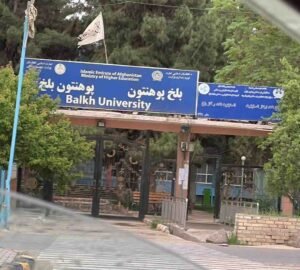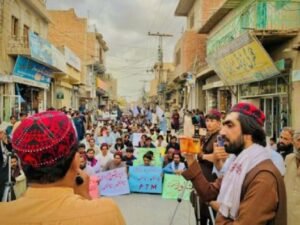Unfulfilled Mission: Diplomacy’s Role in Protecting the Rights of Afghan Women After Military Withdrawal

An Afghan woman in a traditional burqa in Kabul. In the background is a U.S. military humvee, symbolizing the remnants of their military presence after the withdrawal of their last combat soldier on August 31, 2021. Photo: @AADIL
By Nazila Jamshidi
August 15, 2023, marks the second anniversary of the end of the 20-year-long war in Afghanistan, which had been termed the longest war in American history — and a day that the Taliban proclaimed their historic victory. Following the war’s end, on August 31, 2021, President Biden pledged to support the Afghan people, with a particular focus on women, through diplomatic efforts. In his announcement, President Biden emphasized the commitment to continue supporting the Afghan people through diplomacy, international influence, and humanitarian aid. He stressed the importance of advocating for the fundamental rights of Afghan women and girls, making human rights a cornerstone of the United States’ foreign policy.
However, two years after the chaotic exit from Afghanistan, U.S. officials are facing challenges in exerting influence over the Taliban’s top decision-makers regarding women’s rights in the country. As Afghanistan’s situation worsens, it becomes a growing concern for President Biden’s human rights record. The deepening misery in Afghanistan raises questions about the effectiveness of diplomatic efforts and international influence in safeguarding the rights of Afghan women. The ongoing struggle to protect these rights in the country casts a shadow on the U.S. government’s actions and commitments, impacting its human rights reputation on a global scale.
The U.S. Department of State’s appointment of Rina Amiri as the U.S. Special Envoy for Afghan Women, Girls, and Human Rights was expected to enhance U.S. diplomatic efforts in engaging with the Taliban on critical issues. Special Envoy Amiri has demonstrated her skills and expertise in driving engagement on these matters through various means. However, despite these efforts, the world’s worst women’s rights crisis remains unresolved through diplomatic engagement.
A recent example of diplomatic engagement occurred on July 30 and 31, when Special Representative for Afghanistan Thomas West and Special Envoy Amiri met with senior Taliban representatives in Doha, Qatar. During the meeting, U.S. officials urged the Taliban to reverse policies responsible for the deteriorating human rights situation in Afghanistan, particularly for women, girls, and vulnerable communities. However, just five days after the meeting, officials from the Taliban-ruled Ministry of Education announced a ban on girls over the age of 10 from attending primary schools in Central Ghazni province.
This incident highlights the limitations of diplomacy, even as it has been described as the new mission for the U.S., with Secretary of State Antony Blinken stating, “The military mission is over. A new diplomatic mission has begun.” Unfortunately, diplomatic efforts have proven to be ineffective in addressing the grave challenges faced by women’s rights in Afghanistan.
Diplomatic Engagement and Afghan Women’s Rights Under the Taliban
The appointment of a Special Envoy was intended to bring attention and solutions to the critical issues facing Afghan women and girls, but tangible progress remains elusive. The ongoing crisis serves as a reminder of the complex and daunting task ahead for promoting human rights in Afghanistan.
Undoubtedly, diplomacy has played a significant role in transforming Afghanistan from one of the most isolated countries in 2001 to one of the most connected until August 2021. With the Taliban regaining power, many hoped that diplomatic engagement could hold them accountable for their promises, especially their commitment to temporarily lift restrictions on girls’ education. While some analysts continue to advocate for diplomatic involvement, its potential to restore the rights of Afghan women remains uncertain.
The Taliban’s leadership understands that to maintain public services and prevent the state’s collapse, they require financial and technical support. This assistance would assist in restructuring their security forces, establishing fiscal management, and enhancing the capacity to deliver essential services to citizens. Western diplomats aimed to use diplomatic engagement as a means to set benchmarks that the group must meet to receive international assistance.
However, the Taliban has yet to take the necessary steps to meet the valid demands of the international community and, more crucially, address the rights of Afghan women. Despite diplomatic efforts, the promises made by the Taliban have not translated into meaningful actions on the ground. The situation poses significant challenges to the prospects of restoring women’s rights and raises doubts about the effectiveness of diplomatic approaches in this specific context.
The truth is that despite the international community’s efforts to use diplomacy, the Taliban now holds sway over Afghanistan and has enforced their agenda upon Afghan women. Despite the courageous nonviolent protests by Afghan women, their influence has not yet spread countrywide. Without broad support from Afghan men, it is unlikely that their situation will significantly change anytime soon, potentially taking decades to see substantial progress.
In response to the new regime, Western nations initially adopted measures to isolate them, such as reducing development assistance, freezing assets, and imposing sanctions. Despite these actions leading to a significant increase in poverty, the Taliban leadership has not shown concern for the warning signs. They have yet to demonstrate effective governance in critical areas, failing to meet people’s basic needs despite holding a monopoly of power. Thus, offering relief from sanctions and providing foreign aid and humanitarian assistance are unlikely to sway the Taliban’s leadership, as their primary focus is not securing lasting legitimacy and winning the hearts of Afghan citizens.
Europe, the United Nations, and the United States have linked their recognition of the Taliban to their adherence to human rights, the empowerment of women and girls, and the establishment of an inclusive government. The withholding of recognition remains the most potent tool in the international community’s arsenal and should be judiciously exercised. When considering non-humanitarian aid, it should be contingent upon the assurance of educational opportunities for girls and women. By implementing such conditions, the international community can, to some extent, incentivize positive actions from the Taliban and safeguard the rights and well-being of Afghan women and girls.
Nazila Jamshidi – a gender equality and human rights specialist involved in Afghanistan’s development and democracy processes for the past decade – has worked for the UN, USAID, the International Federation of Red Cross.
Note: The contents of the article are of sole responsibility of the author. Afghan Diaspora Network will not be responsible for any inaccurate or incorrect statement in the articles.








